Society for Science & the Public (SSP) announced today that 15 Harker seniors were named semifinalists in the 2015 Intel Science Talent Search, more than any other school in the country. In 2012, Harker had a record 11 semifinalists, so this year represents a new high watermark!
“Inquiry, curiosity and persistence embody the culture of The Harker School,” said Anita Chetty, science department chair. “The development of scientific thinking and effective communication of discoveries is part of instruction in all of the subjects we teach. This is a significant achievement for our school, yet it is a natural outcome of the daily work of our dedicated preschool-through-grade 12 faculty and our outstanding students. When I think of the diversity of research questions that our students posed and the significance of their findings, I am left with so much hope that our next generation will find solutions to the world’s most pressing problems.”
More than 1,800 students from 460 high schools entered this year’s Intel Science Talent Search; from those entrants, 300 semifinalists were selected. Each semifinalist will receive a $1,000 cash prize and is eligible to become a finalist in this year’s contest. An additional $1,000 is awarded to each semifinalist’s school. Finalists receive an all-expenses-paid trip to Washington, D.C., for the final stage of the competition, where more than $1 million in prizes will be awarded. SSP will announce the 40 national finalists in this year’s competition on Jan. 21.
This year’s semifinalists and their project titles are:
Shikhar Dixit (“Immunomodulation by Human Retinal Pigment Epithelial Cell Line ARPE-19”)
Andrew Jin (“A Machine Learning Framework to Identify Selected Variants in Regions of Recent Adaptation”)
Rohith Kuditipudi (“Bayesian Time Series Analysis of Liver Disease Progression”)
David Lin (“Characterizing Gravitationally Bound Halo Structures in Cosmological Dark Matter Simulations”)
Cindy Liu (“Characterizing Novel Binders as Tools for Understanding Chloride Transport Mechanisms”)
Neil Movva (“How do Teeth Grow? Characterizing the Morphogenesis of the Periodontal Ligament through Complementary Biomechanical and Histological Analysis”)
Pranav Reddy (“Differential Motif Discovery to Isolate Associated Sequences and Relevant Transcription Factors for Alzheimer’s in a Mouse Model”)
Anokhi Saklecha (“The Utilization of RGD-coated Gold Nanoprisms and Optical Coherence Tomography to Target alphavbeta3 integrin: A Novel Method to Detect Circulating Tumor Cells”)
Nikash Shankar (“A Potential Therapy for Alzheimer’s Disease: Encapsulation of Curcumin within Polymeric PLGA-PEG Nanoparticles Protects Neuro2A Cells from Beta-Amyloid Induced Cytotoxicity and Improves Bioavailability”)
Sriram Somasundaram (“A Novel Design and Evaluation of Chitosan Nanoparticle Ocular Drug Delivery System Using Protein-Ligand Docking Simulations and pH Dependent Corneal Permeation”)
Kailas Vodrahalli (“Transporting Solar Energy Through Optical Waveguides for Concentrated Solar Power Applications”)
Steven Wang (“Computer-Aided Genomic Characterization of Colorectal Cancer Driver Genes for Oncogenic Transformation of Primary Colon Organoids”)
Menghua Wu (“Characteristics of Drug Combination Therapy in Oncology by Analyzing Clinical Trial Data on ClinicalTrials.gov”)
Leo Yu (“A Novel Algorithm to Unify CMIP5 Ensemble Climate Models for Optimal Climate Projections”)
Andrew Zhang (“The Dearth of Lithium-Rich Stars in Globular Clusters”)
The Science Talent Search, launched by SSP in 1942 in a partnership with Westinghouse, has since become one of the country’s most respected science contests for high school seniors. It has been sponsored by Intel since 1998. Congratulations to students, mentors and teachers, and good luck in the next round!
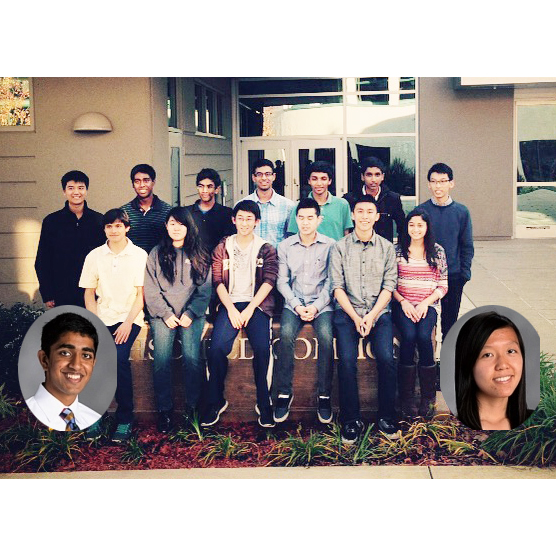



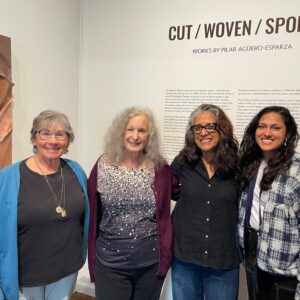
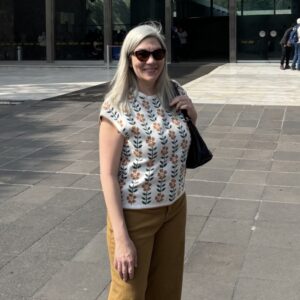

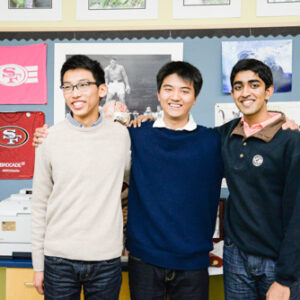
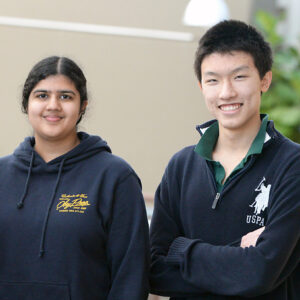

![[UPDATED] Senior Jonathan Ma Named Intel Science Talent Search Finalist Photo by Mark Kocina](https://news.harker.org/wp-content/uploads/2016/01/Jonathan-Ma-300x300.jpg)
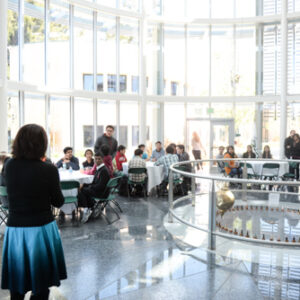
![[UPDATED] Three Harker students named STS finalists, most from any school in the country Photo by Mark Kocina](https://news.harker.org/wp-content/uploads/2017/01/2017-01_Regeneron_Scholars_MK_0544-300x300.jpg)
![[UPDATED] Senior Michelle Wei places third in Regeneron Science Talent Search MichelleWei_2324](https://news.harker.org/wp-content/uploads/2024/01/MichelleWei_2324-300x300.jpg)